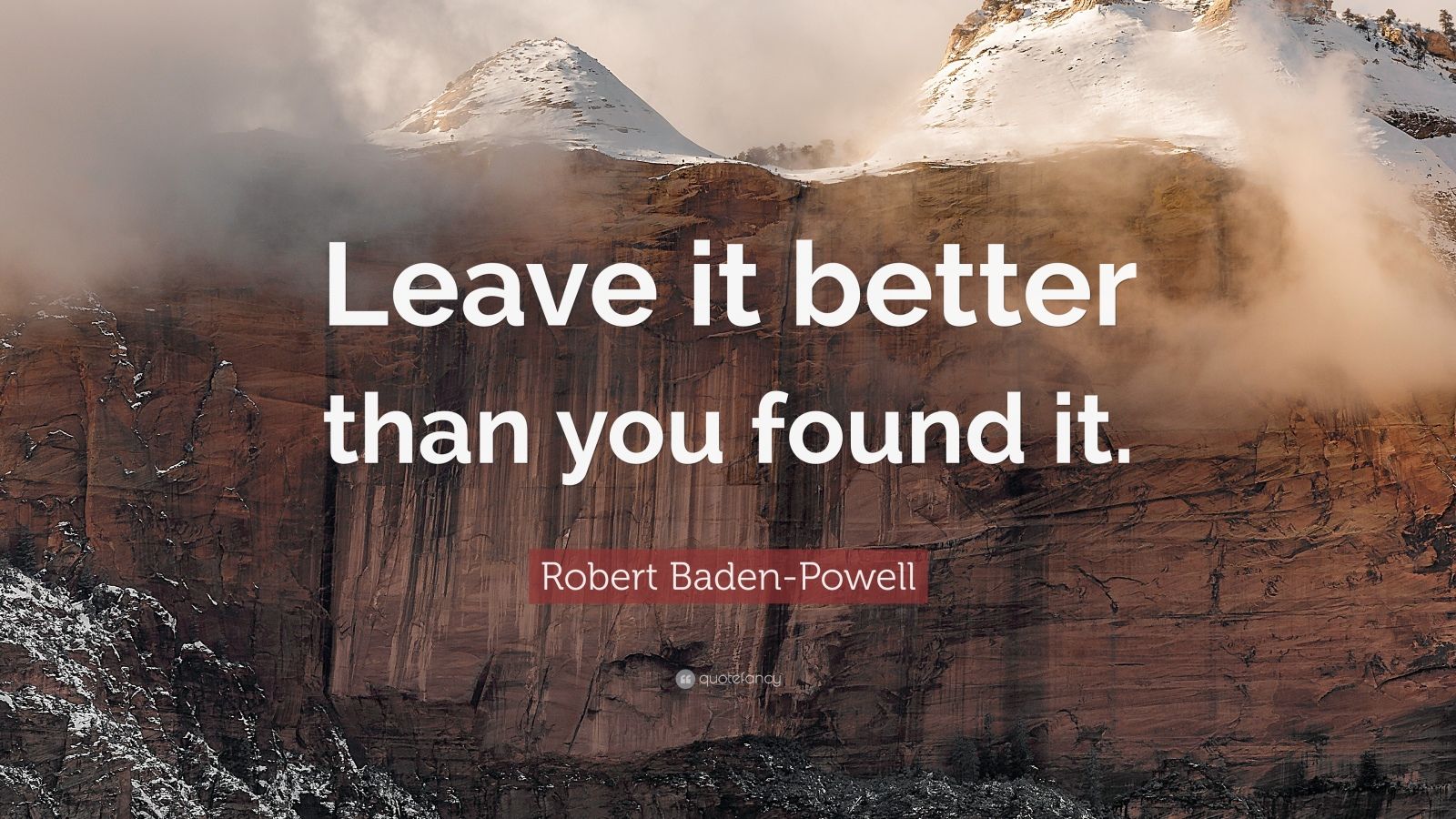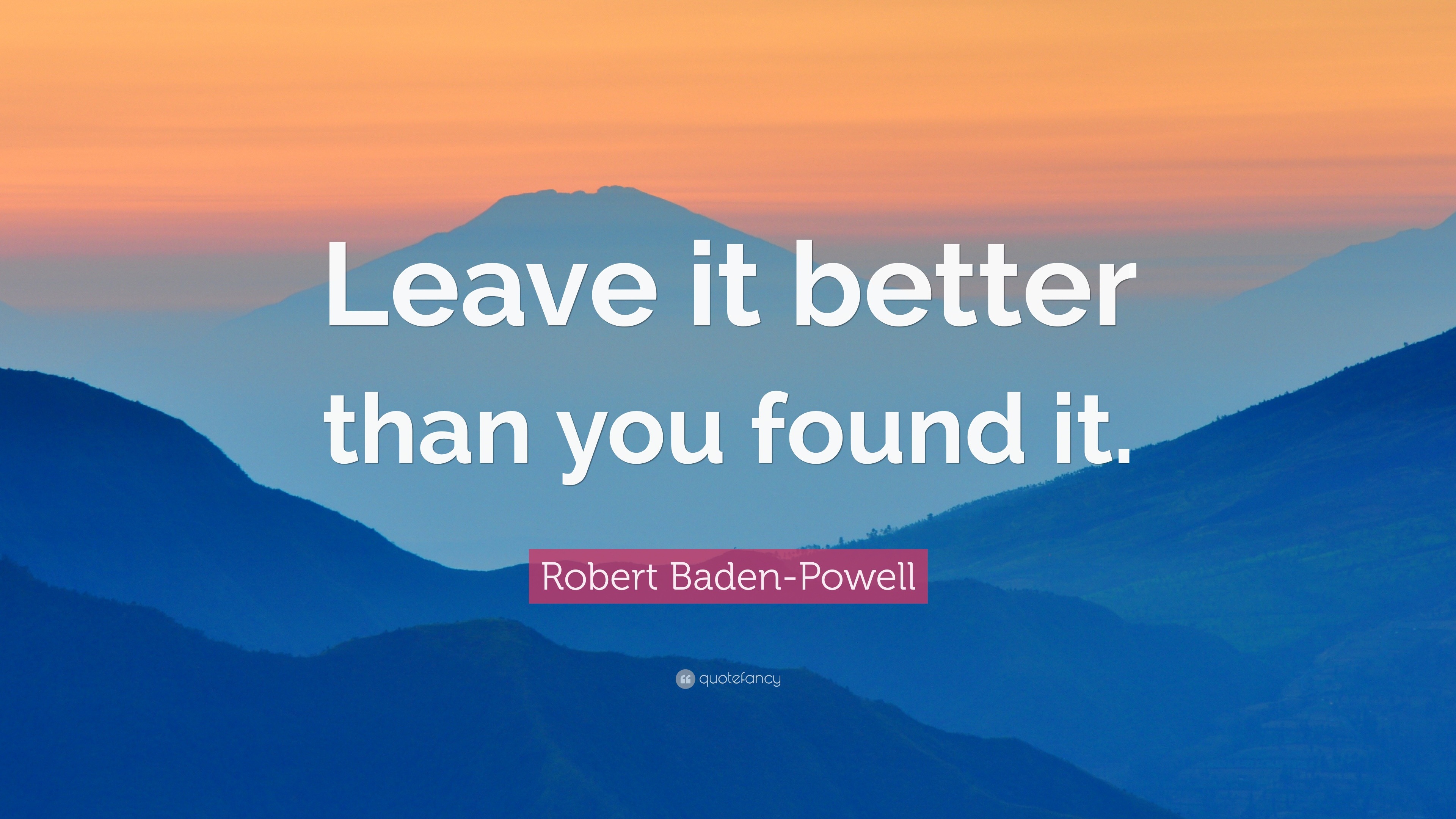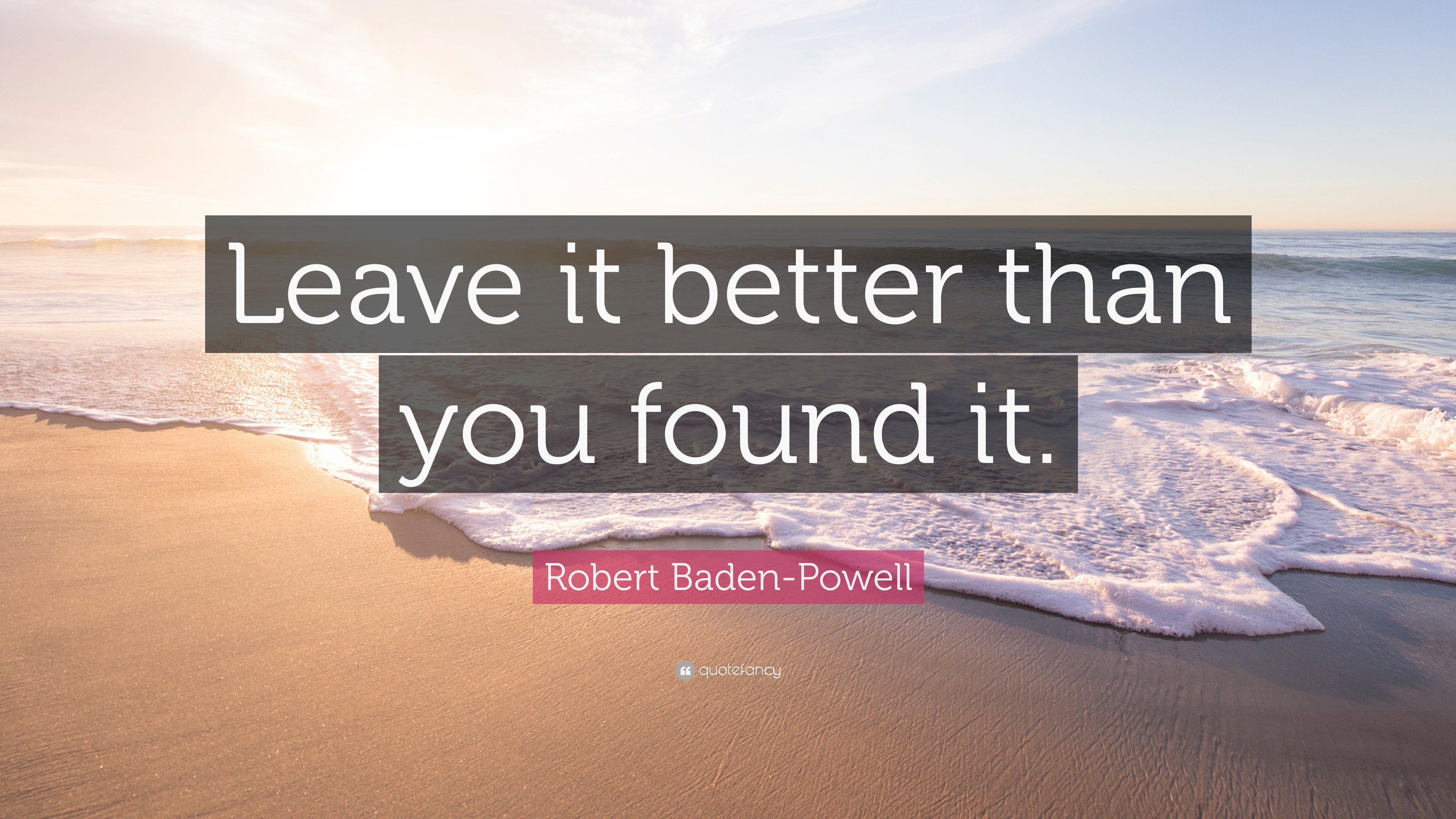Leave It Better: A Timeless Principle For Lasting Impact
Table of Contents
- The Core Philosophy: Understanding "Leave It Better Than You Found It"
- From Personal Spaces to Professional Arenas: Applying the Principle
- Environmental Stewardship: Leaving a Greener Planet
- Nurturing Relationships: Leaving Hearts Fuller
- The Digital Footprint: Leaving a Positive Online Legacy
- Overcoming Challenges: When "Leaving Better" Seems Impossible
- The Ripple Effect: How One Act of Improvement Multiplies
- Measuring Your Impact: What Does "Better" Truly Mean?
- Embracing the Philosophy for a Fulfilling Life
The Core Philosophy: Understanding "Leave It Better Than You Found It"
At its heart, "leave it better than you found it" is a philosophy of continuous improvement and responsible custodianship. It's an understanding that our brief passage through any given space, situation, or relationship carries with it a responsibility to enhance, rather than merely consume or exist. This principle is not about grand gestures or monumental transformations, but rather about the accumulation of small, intentional acts that collectively elevate the state of things. When we delve into the meaning of "leave," we find definitions that perfectly align with this profound sentiment. To "bequeath" or "devise" something is to leave it to someone else, often implying a valuable inheritance. In this context, the quote urges us to consider what we are bequeathing to those who come after us – not just material possessions, but improved systems, healthier environments, stronger communities, and richer experiences. It’s about ensuring that what we "let remain or have remaining behind after going, disappearing, ceasing, etc." is an improvement, a positive mark of our presence. This contrasts sharply with simply "going away from a place or a situation" without any consideration for its state upon our departure. The philosophy encourages us to make every possible effort to contribute positively before we go. This concept transcends simple tidiness or maintenance. It's about proactive engagement, a mindset that seeks out opportunities for improvement. Whether it’s a physical space, a project, a team, or a relationship, the goal is to identify areas where positive change can be made and to act on them. It’s a commitment to leaving a positive legacy, ensuring that our temporary presence yields lasting benefits for others.From Personal Spaces to Professional Arenas: Applying the Principle
The beauty of the "leave it better than you found it" philosophy lies in its universal applicability. It’s not confined to specific domains but can be woven into the fabric of our daily lives, from the most intimate personal spaces to the broadest professional landscapes.Cultivating a Better Home and Community
Our homes are our sanctuaries, and the principle of leaving things better begins here. It's about more than just cleaning up; it's about maintaining, organizing, and even enhancing our living spaces for ourselves and our families. This could mean fixing a leaky faucet, decluttering a room, or planting a garden. It extends to how we interact with shared spaces in our homes, ensuring we don't just "go away from someone or something" leaving a mess behind, but rather contribute to a harmonious environment. Beyond our immediate dwellings, this principle extends to our communities. Participating in local clean-up drives, volunteering for neighborhood initiatives, supporting local businesses, or simply being a considerate neighbor are all ways to apply this philosophy. When we "go out of or away from" our homes into the community, we carry with us the responsibility to contribute positively. Even if we are only "going away from a place or a situation, either permanently or for a temporary period," our actions, however small, can leave a lasting positive impression. For instance, if you're taking a "leave of absence" from your community activities, the foundation of positive contributions you've built remains.Elevating Your Workplace and Career
In the professional realm, the "leave it better than you found it" mantra is a powerful driver of success and positive impact. It’s about more than just completing your tasks; it’s about improving processes, mentoring colleagues, sharing knowledge, and contributing to a positive work culture. When you take on a project, the goal isn't just to finish it, but to refine it, streamline it, and ensure it's in a better state for the next person or team who interacts with it. This involves a commitment to "make every possible effort" to enhance your contributions. Consider the act of transitioning roles or taking a "leave of absence" from your primary job. A truly professional approach involves documenting your work, organizing files, and ensuring a smooth handover. This embodies the idea of "to authorize military leave, document the start and stop of such leave, Record address and telephone number where you may be contacted in case of emergency during." While this specific phrase refers to military leave, the underlying principle of thorough documentation and ensuring continuity applies broadly. You are consciously working to "let remain or have remaining behind" a system that is more efficient and understandable. By doing so, you are not just "going away from a place or a situation," but actively setting up your successor for success, leaving a positive mark on the organization long after you've moved on. This approach builds trust and authority, demonstrating expertise and a commitment to the greater good of the team and company.Environmental Stewardship: Leaving a Greener Planet
Perhaps nowhere is the principle of "leave it better than you found it" more critical than in our relationship with the natural environment. Our planet is a shared inheritance, and every action we take has an ecological footprint. This philosophy compels us to become responsible stewards of the Earth, actively working to mitigate our impact and restore what has been depleted. This means embracing sustainable practices in our daily lives: reducing waste, conserving energy, recycling diligently, and choosing environmentally friendly products. It extends to advocating for policies that protect natural resources and participating in conservation efforts. When we visit natural spaces, like parks or trails, the rule is simple: "to go away from a place or a person" means taking all our trash with us, avoiding disturbing wildlife, and leaving the area pristine for others. We must "refrain from disturbing or interfering" with natural habitats, and instead, actively contribute to their preservation. The long-term implications are profound. By consciously striving to leave a greener planet, we are ensuring that future generations inherit a world that is not just habitable, but thriving. This commitment to environmental betterment is a testament to our collective responsibility and a crucial component of our global legacy. It is about understanding that when we "go out of or away from" a natural setting, we should leave it in a state that supports life and beauty for years to come.Nurturing Relationships: Leaving Hearts Fuller
The "leave it better than you found it" principle isn't limited to physical spaces or tangible projects; it applies equally, if not more profoundly, to our human connections. Every interaction, every conversation, every relationship is an opportunity to contribute positively, to uplift, and to enrich. This means practicing empathy, active listening, and genuine support. It's about offering encouragement, celebrating successes, and being a comforting presence during challenges. When we "go away from someone or something," even for a short time, the quality of our interaction should leave them feeling heard, valued, and understood. It's about ensuring that our presence in someone's life leaves their heart fuller, their spirit lighter, and their perspective broadened. Conversely, it also means avoiding leaving behind emotional baggage, unresolved conflicts, or negative impressions. It’s about taking responsibility for our words and actions, and striving to repair any damage we might inadvertently cause. By consciously choosing to "refrain from disturbing or interfering" with others' peace and instead contributing to it, we build stronger, more resilient relationships. This commitment to leaving relationships in a better state fosters trust, deepens bonds, and creates a network of positive human connection that enriches everyone involved. The "meaning of leave is bequeath, devise" takes on a beautiful, intangible form here, as we bequeath positive emotional experiences and memories.The Digital Footprint: Leaving a Positive Online Legacy
In our increasingly interconnected world, the concept of "leave it better than you found it" extends into the digital realm. Our online presence – from social media interactions to content creation – forms a digital footprint that can have lasting impact. This principle calls us to be mindful and responsible digital citizens. This means contributing constructively to online discussions, sharing accurate and helpful information, and refraining from negativity or harmful content. It's about curating a digital space that is informative, inspiring, and respectful. When we engage in online communities, we should strive to "leave" them more knowledgeable, more cohesive, or more positive than when we joined. This involves consciously choosing to "stop doing or using" practices that are detrimental to online discourse and instead fostering an environment of mutual respect. Our digital legacy, much like our physical one, is what we "let remain or have remaining behind after going, disappearing, ceasing, etc." online. It's the sum of our contributions, comments, and creations. By consciously working to leave a positive digital footprint, we contribute to a healthier, more productive online environment for everyone, making the internet a better place for future users. This is a modern application of the timeless quote, ensuring that our virtual presence also reflects our commitment to improvement.Overcoming Challenges: When "Leaving Better" Seems Impossible
There will inevitably be times when the idea of "leaving it better than you found it" feels overwhelming, perhaps even impossible. We might encounter situations that are deeply entrenched in negativity, or face obstacles that seem insurmountable. It's easy to become disheartened and simply "go away from a place or a situation" without attempting to improve it. However, the power of this philosophy lies in its emphasis on *effort* and *intention*, not necessarily immediate, dramatic results. Even in the most challenging circumstances, there is always something, however small, that can be done. This is where the phrase "to make every possible effort" becomes crucial. It might mean identifying one small process improvement in a dysfunctional workplace, offering a word of kindness in a tense environment, or simply choosing not to add to the negativity. The key is to focus on what *is* within your control. You may not be able to fix an entire system, but you can improve your corner of it. You may not be able to change someone's entire outlook, but you can offer a moment of genuine connection. The commitment to "leave it better than you found it" is a continuous journey, a persistent striving, even when the path is steep. It reminds us that every incremental improvement contributes to a larger positive shift, and that even the smallest efforts can plant the seeds for future growth.The Ripple Effect: How One Act of Improvement Multiplies
The true power of the "leave it better than you found it" philosophy lies in its inherent ripple effect. A single act of improvement, no matter how minor, rarely remains isolated. Instead, it tends to inspire further positive actions, creating a chain reaction that extends far beyond the initial effort. When you take the initiative to clean up a public space, others are more likely to maintain its cleanliness. When you streamline a process at work, it often encourages colleagues to identify and implement their own efficiencies. When you offer kindness and support in a relationship, it fosters an environment where others feel safe to do the same. This demonstrates how "to cause or allow" positive change can spread. This multiplicative effect is what makes the philosophy so impactful. It's not just about what *you* leave behind, but about the inspiration and empowerment you ignite in others. Your commitment to improvement becomes a model, encouraging others to adopt a similar mindset. This collective effort then amplifies the positive change, leading to transformations that are far greater than any individual could achieve alone. It ensures that when you "go out of or away from" a situation, the positive momentum continues. This compounding effect is a testament to the power of human intention and collective action, proving that a single dedication to "leave it better than you found it" can truly change the world.Measuring Your Impact: What Does "Better" Truly Mean?
While the principle of "leave it better than you found it" is universally applicable, the definition of "better" itself can be subjective and context-dependent. Understanding what "better" means in specific situations is crucial for effectively applying this philosophy.Defining "Better" in Different Contexts
In a physical space, "better" might mean cleaner, more organized, or more aesthetically pleasing. In a professional setting, it could mean more efficient, more collaborative, or more innovative. In a relationship, "better" might translate to more trusting, more understanding, or more supportive. For the environment, it means more sustainable, healthier, or more biodiverse. The key is to identify specific, measurable improvements where possible, or to articulate the desired qualitative changes. For instance, if you are working on a project, "better" might mean reducing errors by 10%, or increasing team communication by implementing a new tool. In a community context, it could mean a cleaner park, or a more vibrant local event. This requires thoughtful consideration of the current state and a clear vision for the desired improved state.Documenting Progress and Lessons Learned
To truly understand if you've left something better, it can be helpful to document the "before" and "after." This doesn't necessarily mean formal reports for every small action, but rather a conscious awareness and, for larger initiatives, a record of changes made and their impact. This mirrors the meticulousness required when "to authorize military leave, document the start and stop of such leave, Record address and telephone number where you may be contacted in case of emergency during." While that phrase refers to administrative tracking, the underlying idea of recording conditions and changes is highly relevant. Reflecting on what worked, what didn't, and what lessons were learned is also part of leaving things better. This knowledge transfer ensures that future efforts can build upon past successes and avoid repeating mistakes. By consciously reflecting on how you "leave" things, you refine your ability to make a positive impact, continuously improving your approach to this timeless principle.Embracing the Philosophy for a Fulfilling Life
The principle of "leave it better than you found it" is more than just a guideline for responsible behavior; it's a pathway to a more fulfilling and purposeful life. By consciously adopting this mindset, we shift our focus from mere consumption to active contribution, from passive existence to intentional impact. This philosophy encourages us to see opportunities for improvement everywhere – in our homes, our workplaces, our communities, and our relationships. It transforms ordinary tasks into meaningful acts of stewardship. It challenges us to always ask, "How can I enhance this? How can I contribute positively to this situation before I go away from it?" Ultimately, living by this principle enriches not only the world around us but also our inner lives. The satisfaction of knowing you've made a positive difference, however small, is a profound reward. It builds a sense of purpose, fosters gratitude, and cultivates a deeper connection to the world and its inhabitants. So, let us embrace this timeless wisdom, and with every step we take, strive to "leave it better than you found it."Conclusion
The adage "leave it better than you found it" is a powerful call to action, a guiding philosophy that encourages us to be active contributors and responsible stewards in every aspect of our lives. From meticulously improving our personal spaces and professional environments to nurturing our relationships and safeguarding our planet, this principle compels us to consider the lasting impact of our presence. It's about understanding that what we "bequeath" or "devise" to the future, whether tangible or intangible, should always be an improvement on the past. By embracing this mindset, we not only create positive change in the world but also cultivate a deeper sense of purpose and fulfillment within ourselves. It’s a commitment to "make every possible effort" to enhance, uplift, and enrich, ensuring that when we "go away from a place or a situation," we leave behind a legacy of betterment. What are your thoughts on this powerful philosophy? How do you apply "leave it better than you found it" in your daily life? Share your experiences and insights in the comments below, and consider sharing this article to inspire others to embrace this transformative principle. For more insights on sustainable living and personal growth, explore other articles on our site!
Robert Baden-Powell Quote: “Leave it better than you found it.” (12

Robert Baden-Powell Quote: “Leave it better than you found it.”

Robert Baden-Powell Quote: “Leave it better than you found it.”